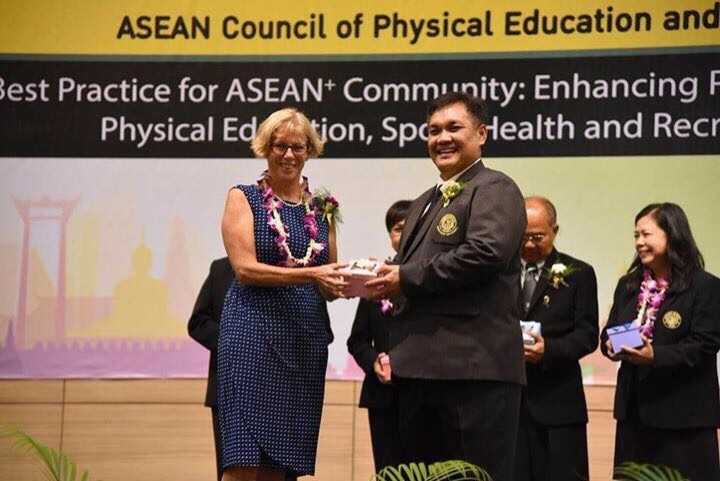School of Kinesiology and Recreation professor Barbara Schlatter delivered a keynote address at Kasetsart University, Thailand in September 2017 at the 3rd international conference on physical education, health, and sport. Her presentation, “Recreation and the experience economy: A best practice model for the association of southeast Asian nations,” focused on the application of recreation program design and experience economy principles to enhance experiences in sport, physical education, and health settings. Represented at the conference were approximately 300 educators, students, and industry professionals from Southeast Asian countries including Indonesia, Malaysia, Philippines, Singapore, and Thailand.
“My keynote presentation was one of four,” Schlatter described. “There were also poster presentations, oral research presentations, and hands on workshops.”
Even though Schlatter was on the other side of the world, she learned how big Illinois State’s alumni network reaches. Recreation Administration master’s alumna, Mayuree Suphawibul, approached Schlatter after her keynote and shared many fond memories of her experience at ISU. Additionally, Schlatter was able to have dinner with three other alumni who she has worked with on several occasions as a visiting professor; Panpim Cheaupalakit, Ed.D. ’02, Natedow Napatalong, M.S. ’07, and Malin Dejtisak, M.S. ’09. These Illinois State alums are currently employed at Srinakharinwirot University in Bangkok in the International College division.
This trip went beyond the networking portion. Schlatter is enthusiastic about bringing a new wealth of knowledge back to her Bloomington-Normal home.
“Based on the research presentations made at the conference, youth in Association of South East Asian Nations (ASEAN) nations are facing similar problems of sedentary behavior and physical inactivity as our youth,” Schlatter explained. “There are increased incidence of childhood obesity and related illnesses among southeast Asian youth.”
Although Schlatter has been to Southeast Asia before, she was delighted to have the opportunity to travel back, share her knowledge, and meet new colleagues and college students from various nations.
“Sharing dinner often meant sitting with 5 or 6 individuals, all of whom were from different countries,” Schlatter described. “People were always eager to talk to one another about everything from politics and religion, to family life and customs.”

